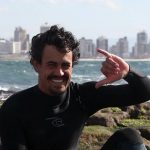On April 28, 2014, we lost an amazing friend and colleague, Coll Gordon Perske. To honor Coll’s life and unwavering dedication to marine mammals, the National Marine Mammal Foundation established the Coll Perske Memorial Fund for Marine Mammals. The mission of the fund is to improve the lives of marine mammals, with a focus on California sea lions, through scientific research, education, and promotion of ocean stewardship. The first project launched by the Coll Perske Memorial Fund is the Perske Pinniped Health Project. The Perske Pinniped Health Project will focus on research that continues to enhance the health and welfare of all pinnipeds, with a special emphasis on the California sea lion.
Award Description
The Coll Perske Memorial Fund will be providing two $200 awards for the 22nd Conference on the Biology of Marine Mammals in Halifax, Nova Scotia, Canada (October 22-27, 2017). Awards will be given to student members (undergraduate or graduate) of the Society for Marine Mammalogy (SMM) that are selected for oral presentations regarding research with pinnipeds.
Award winners will be chosen based on the quality of their abstracts, and the alignment of their research with the interests of the Coll Perske Memorial Fund (see https://CGPfund.org). Special consideration will be given to research projects with California sea lions, which were of special importance to Coll.
To apply, please send the following material to cgpfund@gmail.com by July 12, 2017:
- A copy of the abstract submitted to the SMM conference
- Proof of student registration for the SMM conference
- Proof of acceptance for an oral presentation
Award winners will be notified by August 2017.
For more information please visit https://CGPfund.org



